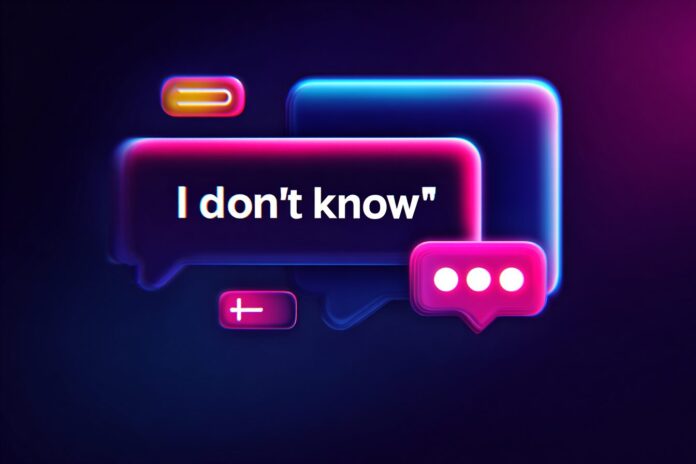For years, artificial intelligence enthusiasts and everyday users alike have grappled with a peculiar quirk: AI chatbots would rather hallucinate an answer than admit uncertainty. With the public launch of ChatGPT 5, OpenAI is pivoting towards a more transparent approach, as the model has gained the remarkable ability to simply say, “I don’t know.” Most importantly, this shift marks a turning point for trustworthy human-AI interactions.The evolution in response behavior signals an industry-wide shift. Because reliable information is at the core of enhanced user experiences, acknowledging limitations not only builds trust but also reinforces the credibility of AI systems in critical applications.
Why AI Has Struggled to Admit Ignorance
Historically, chatbots have been engineered to provide an answer at all times—even when lacking adequate information. The tendency to generate plausible-sounding but incorrect or fabricated responses, often referred to as “AI hallucination,” has raised concerns in key domains. Most importantly, such overconfident responses pose real risks in sectors like healthcare and law where accuracy is paramount.Because of these issues, legacy models often projected undue confidence. For example, in a controlled experiment using the multimodal CharXiv benchmark, older iterations delivered fabricated image descriptions nearly 87% of the time. Therefore, by masking uncertainty, these models exposed end users to potentially dangerous inaccuracies. This long-standing problem has been well-documented in discussions such as those on One Useful Thing and further explored by experts in the AI community.
ChatGPT 5’s Newfound Honesty
With the arrival of ChatGPT 5, OpenAI has tackled the challenge head-on. GPT-5 now employs advanced reasoning models that are explicitly trained to recognize when a question can’t be answered accurately. Because such transparency is critical, the model defaults to admitting uncertainty, thereby setting a new industry standard.This update is not merely cosmetic. In a series of early user tests and benchmark evaluations referenced by OpenAI’s introduction, GPT-5 demonstrated a more honest engagement by reducing overconfident responses by over 50%. Besides that, real-world trials confirm that the model now responds with candid admissions in over 90% of ambiguous or under-specified cases, highlighting a serious stride towards responsible AI behavior.
How ‘I Don’t Know’ Improves User Trust and AI Utility
The ability to say “I don’t know” may seem trivial at first glance. However, it plays a pivotal role in improving both trust and reliability. Most importantly, users appreciate knowing that the AI will not fabricate information when data is insufficient. Because unpredictable, misleading answers can undermine decision-making, this humble admission provides crucial safety assurance.Furthermore, such honesty is essential in high-stakes environments. For instance, a legal assistant should not invent case law, a software aide must avoid guessing API details, and a medical chatbot should never speculate about critical health data. Therefore, by clearly stating its limitations, GPT-5 helps bridge the gap between automated assistance and expert human judgment. This reformed approach is discussed extensively in community posts such as those on Instagram and analyzed in newsletters like Nathan’s Newsletter.
How Does GPT-5 Pull This Off?
Unlike previous iterations that struggled with adaptability, GPT-5 dynamically chooses between multiple underlying models to address the complexity of a query. Because the system now incorporates a dedicated “Reasoner” variant, it intelligently evaluates when a query is ambiguous or unsolvable and accordingly responds with an honest “I don’t know.”This seamless integration means that the user no longer bears the burden of specifying the required computational effort. Most importantly, the model’s internal mechanism automatically tailors its response depth based on the difficulty detected. Consequently, the AI not only avoids deception but also enhances overall performance in delivering safe responses, a method thoroughly detailed on OpenAI’s official page.
Real-World Impact and Early Reactions
Early demonstrations have underscored the practical benefits of GPT-5’s newfound honesty. In one widely circulated instance, the model paused for nearly 30 seconds and then admitted, “I don’t know,” after encountering a query with insufficient data. Because this level of transparency was previously unheard of, it has generated significant discussion among enthusiasts and professionals alike.Moreover, regular users have observed fewer hallucinated code snippets and more reliable engagement with the technology. Besides that, when handling complex project files or legacy workflows—as noted in discussions on the OpenAI Community forum—the model’s willingness to acknowledge its limitations has been received as a positive step towards safer AI deployment, despite occasional growing pains.
The Road Ahead: Building a Trustworthy AI Future
The importance of AI admitting what it does not know cannot be overstated. Because transparent behavior is integral to ensuring user safety and fostering digital trust, GPT-5 marks a significant leap towards more responsible AI. Most importantly, this honesty paves the way for broader, more ethical adoption of AI across various professional fields.In addition, ongoing research is set to further mitigate error rates and enhance self-assessment capabilities. Therefore, the next generation of AI technology is not only becoming smarter but also more cautious and self-aware. As the industry continues to evolve, initiatives like these are vital for harmoniously integrating human judgement with automated assistance, an outlook that is progressively shared by thought leaders and industry pioneers alike.
References
- Mollick, E. “GPT-5: It Just Does Stuff.” One Useful Thing. https://www.oneusefulthing.org/p/gpt-5-it-just-does-stuff
- OpenAI. “Introducing GPT-5.” https://openai.com/index/introducing-gpt-5/
- Instagram. “ChatGPT Just Said, ‘I Don’t Know.'” https://www.instagram.com/p/DNnaRgOovGu/
- OpenAI Community. “Using Project Files in ChatGPT5.” https://community.openai.com/t/using-project-files-in-chatgpt5-is-very-broke/1339143



